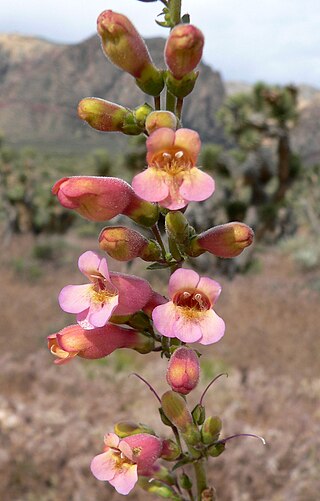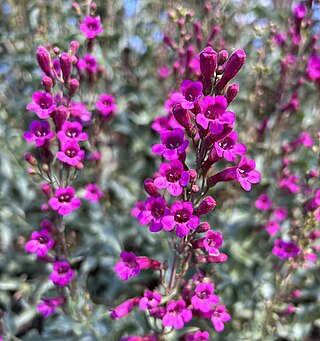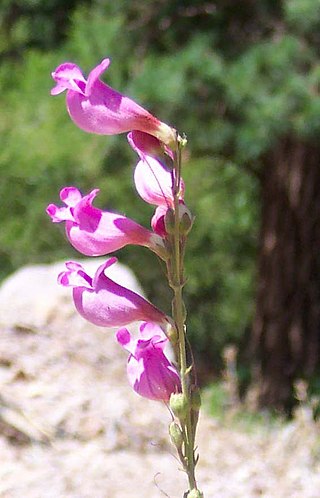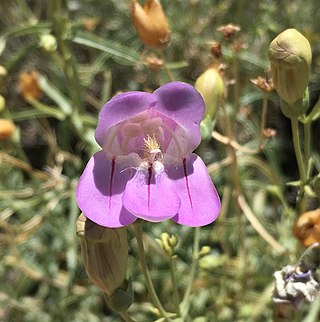
Lupinus bicolor is a species of lupine known as the miniature lupine, Lindley's annual lupine, pigmy-leaved lupine, or bicolor lupine.

Chaenactis glabriuscula, with the common name yellow pincushion, is a species of flowering plant in the daisy family. It is native to California and Baja California.

Lonicera subspicata is a species of honeysuckle known by the common name southern honeysuckle. It is native to Baja California, California, and northern Baja California Sur, where it is known from several areas in mountain and coastal habitat, particularly chaparral. It is a vining shrub which usually climbs on other plants for support.

Penstemon albomarginatus is a rare species of penstemon known by the common name white-margined penstemon. It is native to the deserts of southern Nevada, western Arizona, and southern California.

Penstemon anguineus is a species of penstemon known by the common name Siskiyou penstemon. It is native to the mountains of southern Oregon and northern California, where it grows in coniferous forests, often in open areas left by logging operations.

Penstemon azureus is a flowering plant species known by the common name azure penstemon. It is native to the mountains of Oregon and northern California. It grows in coniferous forests and woodlands in the Klamath Mountains, North California Coast Ranges, Southern Cascade Range, and Northern Sierra Nevada.

Penstemon barnebyi is a species of penstemon known by the common names White River Valley beardtongue and Barneby's beardtongue. It is native to the mountain and basin territory of central western Nevada, where it grows in sagebrush and woodland; there is also one occurrence just over the California border.

Penstemon bicolor is a species of penstemon known by the common name pinto penstemon. It is native to the desert mountains and valleys of southern Nevada, eastern California, and western Arizona, where it grows in scrub, woodland, and other local habitat. It is a perennial herb which may exceed one meter in maximum height.

Penstemon caesius, commonly known as the San Bernardino penstemon, is a low growing species of flowering plant. It is endemic to California, where it is known from the San Bernardino and San Gabriel Mountains, as well as the southern mountains of the Sierra Nevada. It is a member of the flora on rocky slopes and in coniferous forests and alpine habitat in the mountains.

Penstemon calcareus is a species of penstemon known by the common name limestone penstemon. It is native to California, where it is known from the deserts of central San Bernardino County, as well as the Death Valley area, where its distribution extends just over the border into Nevada. It grows in scrub and woodland, often on limestone substrates.

Penstemon centranthifolius is a species of penstemon known by the common name scarlet bugler. It is native to California and parts of Mexico, where it grows in many types of dry habitat from coast to desert, such as chaparral and oak woodland.

Penstemon cinicola is a species of penstemon known by the common name ash penstemon. It is native to northeastern California and southern Oregon, where it grows in forests and plateau habitat.

Penstemon clevelandii is a species of penstemon known by the common name Cleveland penstemon. It is native to southern California and Baja California, where it grows in mountain and desert habitat such as scrub, woodland, and chaparral.

Penstemon deustus is a species of penstemon known by the common names hotrock penstemon and scabland penstemon. It is native to much of the northwestern United States from the Pacific Northwest to Wyoming, where it grows in many types of forest and open plateau habitat, often on soils heavy in volcanic rock or on limestone outcrops.

Penstemon eatonii is a species of flowering plant in the genus Penstemon, known by the common name firecracker penstemon. It is native to the Western United States from Southern California to the Rocky Mountains. It grows in many types of desert, woodland, forest, and open plateau habitat.

Penstemon filiformis is an uncommon species of Penstemon known by the common name threadleaf penstemon. It is endemic to the Klamath Mountains of northern California, where it grows in forest and woodland, often on serpentine soils.

Penstemon floridus is a species of flowering plant in the plantain family known by the common names Panamint penstemon and rose penstemon.

Penstemon fruticiformis is a species of penstemon known by the common name Death Valley penstemon. It is native to the western United States, where it is found growing in rocky scrub, woodlands, deserts and mountains of eastern California and western Nevada. It is known from scattered occurrences around Death Valley, and only one of the two varieties occurs on the Nevada side of the border.

Penstemon labrosus is a species of penstemon known by the common name San Gabriel beardtongue. It is native to the Transverse Ranges of southern California, including the San Gabriel Mountains, and the Peninsular Ranges to the south, its distribution extending into Mexico. It grows in forest and woodland habitat. It is a perennial herb growing erect to about 70 centimeters tall. The long, paired leaves are linear in shape with rolled, untoothed edges, and reach over 8 centimeters in maximum length. The inflorescence produces bright red to orange or yellowish flowers 3 to 4 centimeters long. The upper lip is hood-shaped and the lower is divided into 3 narrow lobes which are sometimes reflexed. The flower is hairless, including the staminode.

Penstemon thurberi is a species of penstemon known by the common names Thurber's beardtongue and Thurber's penstemon. It is native to the southwestern United States and northern Mexico, where it grows in many types of desert and mountain habitat, including sandy flats, chaparral, scrub, and woodlands. It is a shrub growing erect and somewhat rounded in form, reaching around 80 centimeters in maximum height. Many slender stems emerge from its woody base. The leaves are narrow, linear in shape, with edges rolled upward nearly into a tube. The long inflorescence bears funnel-shaped lavender, pink, or pale blue-purple flowers up to 1.5 centimeters in length.






















